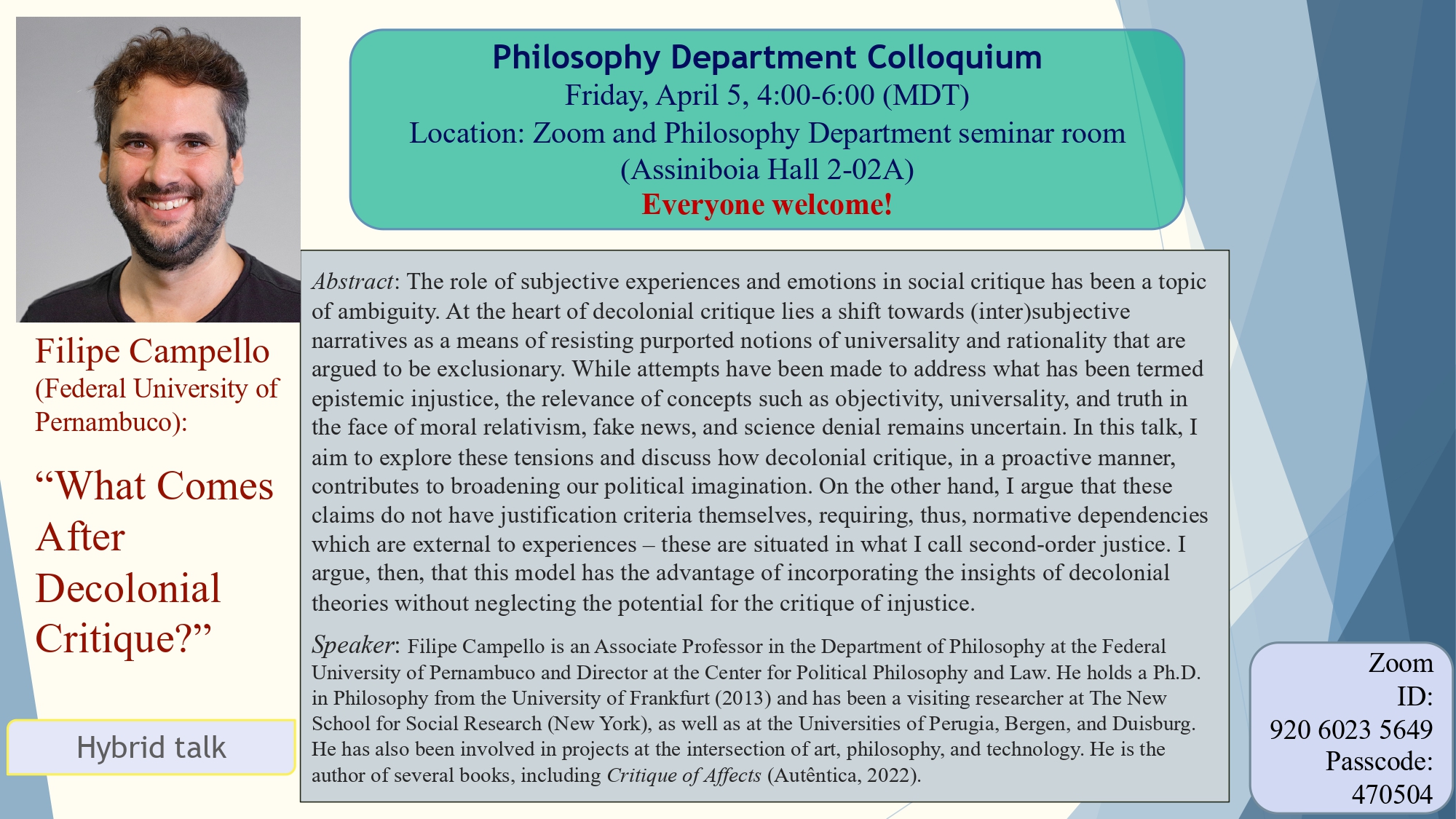April 5 - "What Comes After Decolonial Critique?", a research talk by Filipe Campello
3 April 2024

Join us on Friday, April 5 from 4:00-6:00 PM MDT in person, in the Philosophy Department seminar room (Assiniboia Hall 2-02A), or online for "What Comes After Decolonial Critique?", a research talk by Filipe Campello (Federal University of Pernambuco).
Abstract: The role of subjective experiences and emotions in social critique has been a topic of ambiguity. At the heart of decolonial critique lies a shift towards (inter)subjective narratives as a means of resisting purported notions of universality and rationality that are argued to be exclusionary. While attempts have been made to address what has been termed epistemic injustice, the relevance of concepts such as objectivity, universality, and truth in the face of moral relativism, fake news, and science denial remains uncertain. In this talk, I aim to explore these tensions and discuss how decolonial critique, in a proactive manner, contributes to broadening our political imagination. On the other hand, I argue that these claims do not have justification criteria themselves, requiring, thus, normative dependencies which are external to experiences – these are situated in what I call second-order justice. I argue, then, that this model has the advantage of incorporating the insights of decolonial theories without neglecting the potential for the critique of injustice.
Speaker: Filipe Campello is an Associate Professor in the Department of Philosophy at the Federal University of Pernambuco and Director at the Center for Political Philosophy and Law. He holds a Ph.D. in Philosophy from the University of Frankfurt (2013) and has been a visiting researcher at The New School for Social Research (New York), as well as at the Universities of Perugia, Bergen, and Duisburg. He has also been involved in projects at the intersection of art, philosophy, and technology. He is the author of several books, including Critique of Affects (Autêntica, 2022).
Zoom ID: 920 6023 5649
Passcode: 470504
Abstract: The role of subjective experiences and emotions in social critique has been a topic of ambiguity. At the heart of decolonial critique lies a shift towards (inter)subjective narratives as a means of resisting purported notions of universality and rationality that are argued to be exclusionary. While attempts have been made to address what has been termed epistemic injustice, the relevance of concepts such as objectivity, universality, and truth in the face of moral relativism, fake news, and science denial remains uncertain. In this talk, I aim to explore these tensions and discuss how decolonial critique, in a proactive manner, contributes to broadening our political imagination. On the other hand, I argue that these claims do not have justification criteria themselves, requiring, thus, normative dependencies which are external to experiences – these are situated in what I call second-order justice. I argue, then, that this model has the advantage of incorporating the insights of decolonial theories without neglecting the potential for the critique of injustice.
Speaker: Filipe Campello is an Associate Professor in the Department of Philosophy at the Federal University of Pernambuco and Director at the Center for Political Philosophy and Law. He holds a Ph.D. in Philosophy from the University of Frankfurt (2013) and has been a visiting researcher at The New School for Social Research (New York), as well as at the Universities of Perugia, Bergen, and Duisburg. He has also been involved in projects at the intersection of art, philosophy, and technology. He is the author of several books, including Critique of Affects (Autêntica, 2022).
Zoom ID: 920 6023 5649
Passcode: 470504